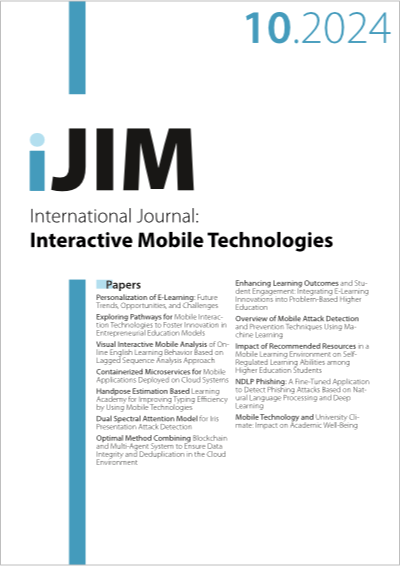Enhancing Learning Outcomes and Student Engagement: Integrating E-Learning Innovations into Problem-Based Higher Education
DOI:
https://doi.org/10.3991/ijim.v18i10.47649Keywords:
E-learning, Problem-based learning, learner engagement, learning outcome, e-learning ecosystem, learner reflectionAbstract
With the rapid development of e-learning in higher education, this study explores the application of the problem-based learning (PBL) learning model in the e-learning ecosystem. This article explores the concept of participatory engagement in the e-learning ecosystem and integrates it with PBL theory through the use of ICT to support interaction and collaboration. The research method used is R&D learning models in the Heavy Equipment Technology course at Universitas Negeri Padang. The research findings should be interpreted cautiously due to limitations such as differences in contexts across various courses and factors related to technology implementation in the learning environment. The study results show that it can improve learning outcomes and students’ critical thinking skills. Specifically, 70% have implemented Bloom’s cognitive taxonomy Level C4 and above, aided by a self-reflection participation process that enables students to reflect on content, learning processes, and understanding through internal dialogue, generating new ideas and solutions. This is evidenced by the results of the Path Coefficients test with P-Value EE → LO 0.050 and PBL → LO 0.046, as well as Specific Indirect Effect EE → SPR → LO 0.003 and PBL → SPE → LO 0.047 where the value is ≤ 0.05. The implications include guidance for designing effective e-learning ecosystems and adaptive learning strategies in higher education. Future research is recommended to further explore the impact of this integration and develop more effective PBL models in diverse courses and other educational institutions.
Downloads
Published
How to Cite
Issue
Section
License
Copyright (c) 2024 Wagino Wagino, Prof. Dr. Hasan Maksum, MT, Wawan Purwanto, S.Pd, MT, Ph.D, Prof. Dr. Wakhinuddin S, M.Pd, Prof. Dr. Ir.Remon Lapisa, ST, MT, M.Sc, Dr. Eko Indrawan, ST, M.Pd

This work is licensed under a Creative Commons Attribution 4.0 International License.



